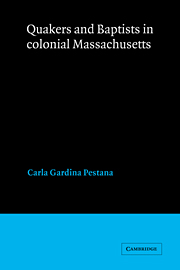8 - Denomination and sect, 1740–1780
Published online by Cambridge University Press: 22 October 2009
Summary
During the late colonial period, both the Boston Baptist Church and the Salem Quaker meeting experienced a crisis in their relationships with the larger society. In the Baptists' case, the church's traditionally accommodating stance created difficulties during the Great Awakening. Only gradually did the church recover from the malaise that overcame it during the 1740s and 1750s, finally forging a denominational identity that undergirded its penchant for accommodation with a newfound strength. The Quakers, who had not previously felt welcomed into colonial society, first confronted opportunities for integration in the post-awakening years. Rather than follow the Baptists in recasting themselves as a denomination, the Quakers rejected these opportunities for social and religious intercourse during the revolutionary years. They chose to remain sectarians. By the end of the colonial period, the Baptists and the Quakers emerged from these ordeals firmly committed to diametrically opposed conceptions of their identities.
Few Massachusetts churches suffered greater upheaval as a result of the Great Awakening than did the Boston Baptist Church. By the early 1740s, the church identified so thoroughly with the establishment that it became caught up in the struggles that divided the orthodox community. Although the Great Awakening would ultimately foster the spread of the Baptist faith, the oldest Baptist church in the colony was traumatized rather than rejuvenated by the revival experience. The troubling implications inherent in the church's accommodating approach played themselves out during the revivals and the years that followed. Only in the mid-1760s did the Baptist church begin to recover. Under the direction of a new minister, the church was finally able to maintain both its traditional stance of accommodation and its viability as a distinctive religious organization.
- Type
- Chapter
- Information
- Quakers and Baptists in Colonial Massachusetts , pp. 167 - 186Publisher: Cambridge University PressPrint publication year: 1991



